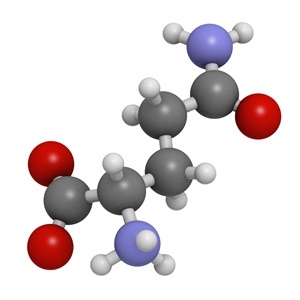
Glutamine is a non-essential amino acid which occurs naturally in the body and can also be found in many foods in a healthy diet. However, during periods of intense exercise, and illness, this can become depleted, which is why supplementation may be required.
Although a non-essential amino acid, it does fuel the immune system and much of it is stored in your muscles, which is why intense exercise or endurance exercise can severely deplete it.
Read: Building muscle: the skinny on how to bulk up
L-Glutamine supplementation health benefits extend past exercise recovery however; it is actively involved in many metabolic processes and is the principal carrier of nitrogen in the body and is an important energy source for many cells.
Other health benefits include:
- Recovery from serious operations, major injuries or burns.
- During times of illness it can help support the immune system and assist the body’s digestive system during infections.
- It also enables the production of a natural anti-oxidant glutathione, which helps prevent cell damage and helps protect cells against oxidising free-radicals, potentially minimising the risk of cancer.
Glutamine and exercise
Intense exercise or endurance exercise causes blood and muscle levels of glutamine to fall and muscles are torn. Using glutamine as a supplement before and after intense training we can stop too much muscle breakdown and assist with protein synthesis to build muscle.
Supplementing with glutamine can also be done through eating foods which contain it, such as:
- Beef, pork and chicken
- Dairy (milk, yoghurt and cheese)
- Tofu and beans
- Eggs
- Raw spinach and cabbage.
Who needs it?
Since glutamine is already produced in the body it’s not necessary to take in great amounts in supplement or food form. Generally the recommended minimum dose of L-glutamine is 10g per day, but depending on circumstances this can increase to 40g/day in the instance of competitive athletes or people with serious health conditions such as cancer.
A study showed that “prolonged exercise and periods of heavy training are associated with a decrease in the plasma glutamine concentration and this has been suggested to be a potential cause of the exercise-induced immune impairment and increased susceptibility to infection in athletes”.
It found that acute intakes of glutamine of about 20–30 g appeared to have no noticible side-effects.
Although the authors cluncluded that more research is needed before definitively concluding that glutamine supplementation has long-term benefits, they “glutamine may have an indirect effect on immune function and infection incidence through preservation of the antioxidant glutathione or maintenance of gut barrier function”.
Read more
Soya and L-glutamine ups immunity
Your guide to banned substances
Why the business of nutritional supplements must be brought into the regulatory fold
References:
L-glutamine: www.aminiacidstudies.org
Dosing and Efficacy of Glutamine Supplementation in Human Exercise and Sport Training: http://jn.nutrition.org/content/138/10/2045S.full




 Publications
Publications
 Partners
Partners














